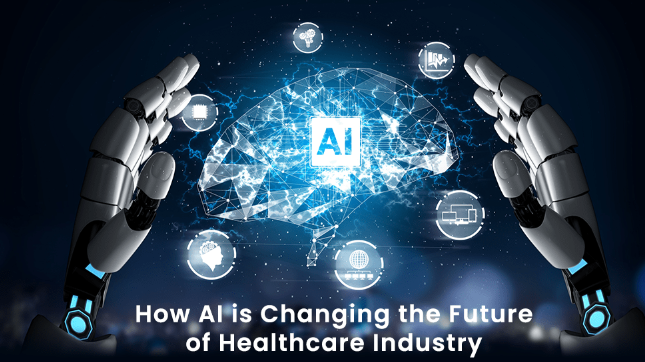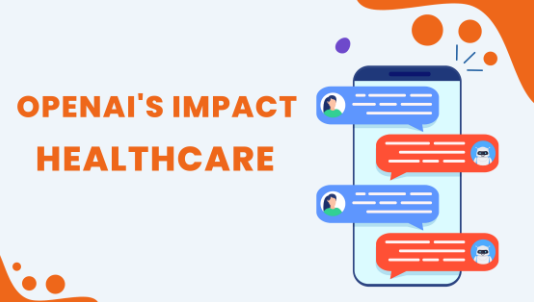In recent years, artificial intelligence (AI) has emerged as a transformative force across various industries, including healthcare. Among the myriad of AI technologies, OpenAI stands out as a frontrunner due to its advanced capabilities and versatility. With its innovative algorithms and models, OpenAI has the potential to revolutionize healthcare in numerous practical ways.

Introduction to OpenAI in Healthcare
OpenAI, founded in 2015, is renowned for its cutting-edge research and development in artificial intelligence. Leveraging deep learning techniques and natural language processing (NLP), OpenAI has paved the way for groundbreaking applications in healthcare. By harnessing vast amounts of data and powerful computational resources, OpenAI enables healthcare professionals to enhance patient care, streamline processes, and make informed decisions.
Disease Diagnosis and Predictive Analytics
One of the most promising applications of OpenAI in healthcare is disease diagnosis and predictive analytics. OpenAI’s algorithms can analyze medical imaging scans, such as X-rays, MRIs, and CT scans, with remarkable accuracy. By detecting subtle patterns and anomalies, these algorithms aid radiologists and clinicians in diagnosing conditions like cancer, cardiovascular diseases, and neurological disorders at earlier stages.
Moreover, OpenAI’s predictive analytics models can forecast disease progression and identify patients at high risk of developing certain health conditions. By analyzing electronic health records (EHRs), genetic data, and lifestyle factors, these models help healthcare providers tailor personalized treatment plans and preventive interventions, ultimately improving patient outcomes.

Drug Discovery and Development
Another area where OpenAI demonstrates its potential in healthcare is a drug discovery and development. Traditional drug discovery processes are time-consuming and resource-intensive, often spanning years and costing billions of dollars. However, OpenAI’s machine learning algorithms can expedite this process by analyzing vast datasets of molecular structures, biochemical interactions, and clinical trial data.
By identifying promising drug candidates, predicting their efficacy and safety profiles, and optimizing molecular designs, OpenAI accelerates the discovery of novel therapeutics for various diseases. Additionally, these algorithms enable researchers to repurpose existing drugs for new indications, reducing the time and cost associated with bringing drugs to market.
Personalized Medicine and Treatment Optimization
Personalized medicine, which involves tailoring medical treatments to individual patients based on their genetic makeup, lifestyle, and environmental factors, holds immense promise for improving patient care. OpenAI plays a crucial role in advancing personalized medicine by analyzing complex datasets and generating actionable insights.
Through genetic sequencing and analysis, OpenAI helps clinicians identify genetic predispositions to certain diseases and predict how patients will respond to specific treatments. By integrating this genomic information with clinical data and real-time monitoring, healthcare providers can optimize treatment regimens, minimize adverse effects, and maximize therapeutic outcomes for each patient.
Virtual Health Assistants and Patient Engagement
Virtual health assistants powered by OpenAI’s NLP technology are transforming the way patients interact with healthcare services. These intelligent chatbots and virtual assistants enable patients to access personalized health information, schedule appointments, refill prescriptions, and receive remote monitoring and support.
By leveraging natural language understanding and generation capabilities, virtual health assistants enhance patient engagement, promote self-management of chronic conditions, and facilitate timely interventions. Moreover, these AI-driven solutions alleviate the burden on healthcare providers by automating routine tasks and triaging patients based on their needs and urgency.
Ethical Considerations and Regulatory Challenges
While the potential benefits of integrating OpenAI into healthcare are undeniable, it is essential to address ethical considerations and regulatory challenges associated with AI implementation. Safeguarding patient privacy, ensuring transparency and accountability in AI algorithms, and mitigating biases in healthcare data are paramount concerns that require careful attention.
Furthermore, regulatory frameworks must evolve to keep pace with the rapid advancements in AI technology, balancing innovation with patient safety and ethical standards. Collaborative efforts between policymakers, healthcare stakeholders, and AI developers are essential to establish guidelines and standards that promote responsible AI adoption in healthcare.
Conclusion
OpenAI’s transformative capabilities are promising to revolutionize healthcare by enhancing disease diagnosis, drug discovery, personalized medicine, and patient engagement. By harnessing the power of artificial intelligence, healthcare providers can improve clinical outcomes, optimize resource allocation, and deliver more efficient and patient-centered care. However, addressing ethical and regulatory challenges is crucial to ensuring the responsible and equitable implementation of AI in healthcare, ultimately advancing the well-being of patients and society as a whole.
FAQs
What is OpenAI?
OpenAI is an artificial intelligence research organization known for developing advanced AI technologies, including natural language processing (NLP) models and machine learning algorithms.
How does OpenAI benefit healthcare?
OpenAI contributes to healthcare by enabling disease diagnosis through medical imaging analysis, accelerating drug discovery, facilitating personalized medicine, and enhancing patient engagement through virtual health assistants.
What are the ethical considerations of using OpenAI in healthcare?
Ethical considerations include ensuring patient privacy, transparency in AI algorithms, mitigating biases in healthcare data, and promoting responsible AI adoption within regulatory frameworks.
What challenges are associated with implementing OpenAI in healthcare?
Challenges include addressing regulatory standards, integrating AI into existing healthcare systems, managing data security, and ensuring equitable access to AI-driven healthcare solutions.
